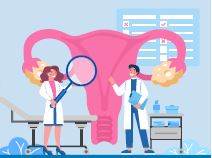Baby girls are usually born with enough eggs to last them till menopause. What happens if the supply is exhausted early?
Menopause can start early, even for young women in their 20s.
When women experience premature menopause symptoms — irregular periods, stoppage of ovulation, and absence of menstruation — it is usually because they have undergone treatment for cancer or other serious illness. For some, primary ovarian insufficiency occurs because of family or genetic causes.
About one per cent of women under 40 years of age suffer from this condition, according to Dr Serene Lim, Consultant, Department of Obstetrics and Gynaecology, Singapore General Hospital (SGH).
“Essentially, in premature ovarian insufficiency, the ovaries stop functioning normally before the age of 40, usually because they have run out of eggs,” Dr Lim said.
Women’s ovaries house small sacs called follicles, which contain eggs and hormone-producing cells. Women are born with numerous ‘seeds’ that turn into follicles, from which eggs are released during ovulation. Typically, there are enough follicles to last till menopause, which occurs in most women in their early 50s.
In premature ovarian insufficiency, the follicles become depleted prematurely. “When that happens, the ovaries stop releasing eggs or release them only intermittently. They also stop producing important hormones or produce them only intermittently,” said Dr Lim.
Women may experience symptoms similar to menopause, such as irregular or no periods, hot flushes, night sweats, insomnia, mood swings, irritability, vaginal dryness, and reduced libido.
The earliest symptom is likely to be a change in their periods. Women who track their menstrual cycles regularly will notice a shorter cycle length — 24 to 25 days between periods instead of the usual 28 to 30 days. “This is a sign that the body is trying to compensate for the ovaries running out of eggs by stimulating ovulation. Eventually the periods will stop altogether as there is no more ovulation,” Dr Lim said.
Women who are at risk and want children are advised to try and get pregnant before their eggs are depleted. Those who are not ready to start a family may be offered fertility preservation procedures, where the woman’s eggs, embryos or ovarian tissues are frozen for future use.
Premature ovarian insufficiency cannot be reversed, and can lead to an absence of important hormones, such as oestrogen and progesterone, which in turn can lead to other complications. “These hormones have a protective effect on the bones and heart. As time goes by, the lack of such hormones can result in bone loss, osteoporosis or heart disease if nothing is done about it,” Dr Lim said.
That is why hormone replacement therapy is usually started when the condition is diagnosed and continued until the average age of menopause.
While premature ovarian insufficiency cannot be prevented, especially if it is due to genetics, lifestyle changes like stopping smoking can help slow down the decline in eggs for women who are at risk. Being vaccinated against mumps and practising safe sex to avoid sexually transmitted infections can help prevent ovarian damage, which in turn lowers the risk for the condition.
“There is still a small chance of pregnancy for these women as intermittent ovarian activity may occur, leading to spontaneous ovulation and conception. But most women would need donor eggs to conceive while others may choose to adopt,” said Dr Lim.
Chromosomes and infectionsMost of the time, the cause of premature ovarian insufficiency is unknown. Known causes include:
• Genetic conditions
- Turner syndrome (most common genetic cause where the woman only has one X chromosome)
- Fragile X syndrome (mutation on the X chromosome)
• Infections that damage the ovaries, such as mumps (rare in Singapore as most people are vaccinated against it)
• Surgery of the ovaries
• Toxins, such as chemotherapy and radiotherapy
• Autoimmune conditions in which the immune system mistakenly attacks the ovaries and other hormone-producing organs, such as the adrenal glands and thyroid glands |
